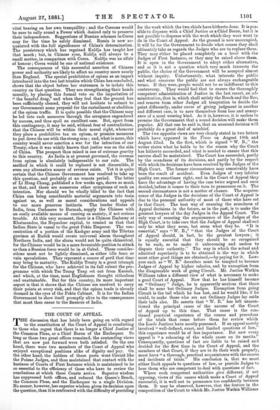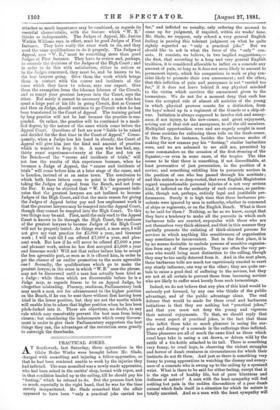THE COURT OF APPEAL. for the work which the two
chiefs have hitherto done. It is pos- sible to dispense with a Chief Justice or a Chief Baron, but it is not possible to dispense with the work which they were wont to do in the Court of Appeal. As the ground is now unoccupied, it will be for the Government to decide what course they shall ultimately take as regards the Judges who are to replace them. They may either be placed completely on a level with the Judges of First Instance, or they may be raised above them. It is open to the Government to adopt either alternative, and as it is not a question which very much interests the public, the choice of the Government will be accepted almost without inquiry. Unfortunately, what interests the public and what concerns the public are not always exchangeable terms. If they were, people would not be so indifferent to this controversy. They would feel that to ensure the thoroughly competent administration of Justice in the last resort, an ad- ministration, that is, which shall satisfy the Bench and the Bar, and remove from other Judges all temptation to decide the point differently, under cover of giving judgment in another and different case, is to save themselves from loss and annoy- ance of a most wearing kind. As it is, however, it is useless to promise the Government that a sound decision will make them popular. All that can be said is, that an unsound decision will probably do a great deal of mischief.
The two opposite views are very clearly stated in two letters which have appeared in the Times on August 18th and August 22nd. In the first, which is signed " W. B.," the writer states what he holds to be the reason why the Court has hitherto succeeded, and what is needed to ensure that this success shall be maintained. The Court has succeeded, partly by the soundness of its decisions, and partly by the respect with which its decisions have been received by the Judges of the High Court. The former circumstance may conceivably have been the result of accident. Even Judges of very inferior quality are sometimes right, and in the Court of Appeal they have the advantage of having the case twice argued and once decided, before it comes to their turn to pronounce on it. The second circumstance is not a matter of chance. The acquies- cence of the Judges in the decisions of the Court of Appeal is due to the personal authority of most of those who have sat in that Court. The best way of ensuring the soundness of Appeal decisions in the future, as in the past, is to make the greatest lawyers of the day Judges in the Appeal Court. The only way of ensuring the acquiescence of the Judges of the High Court, is to take care that the Judges of Appeal shall not only be what they seem, but seem what they be. " It is essential," says " W. B.," " that the Judges of the Court of Appeal should, in fact, be the greatest lawyers ; it is equally essential that they should be so recognised to be such, as to make it unbecoming and useless to dispute their authority." The way in which the actual and admitted superiority is to be obtained is the way in which most other good things are obtained,—by paying for it. Law- yers such as " W. B." describes must be tempted to become Judges of Appeal by higher salaries, and by exemption from the disagreeable work of going Circuit. Mr. Justice Watkin Williams takes a different view of what is necessary to make a good Court of Appeal. Now that he has himself become an " Ordinary " Judge, he is apparently anxious that there shall be none but Ordinary Judges. Exemption from going Circuit is the tail which he has lost, and he would like, if he could, to make those who are not Ordinary Judges lay aside their tails also. He asserts that " W. B." has left unmen- tioned the principal cause of the success of the Court of Appeal up to this time. That cause is the con- tinued practical experience of the course and procedure of the trials that come before them for review which the Lords Justices have mostly possessed. If an appeal merely involved " well-defined, exact, and limited questions of law," this experience would be of less importance. But now every appeal is " a rehearing of the whole cause on its merits." Consequently, questions of fact are liable to be raised and decided for the first time in the Court of Appeal, and the members of that Court, if they are to do their work properly, must have "a thorough, practical acquaintance with the course and incidents of trials." His conclusion is, that we must either limit appeals to questions of law, or provide Judges to hear them who are competent to deal with questions of fact.
Where such competent authorities give different, if not opposing, views of the causes which make a Court of Appeal successful, it is well not to pronounce too confidently between them. It may be observed, however, that the feature in the composition of the Court to which Mr. Justice Watkin Williams
attaches so much importance may be combined, as regards its essential characteristic, with the feature which " W. B." thinks so indispensable. The Judges of Appeal, Mr. Justice Watkin Williams says, in effect, must be good Judges of First Instance. They have really the same work to do, and they need the same qualifications to do it properly. The Judges of Appeal, says " W. B.," must be something more than good Judges of First Instance. They have to review and, perhaps, to overrule the decisions of the Judges of the High Court ; and in order to do this with satisfaction, either to suitors or to the Judges concerned, they must be, and be known to be, the best lawyers going. Give them the work which brings them in contact with the course and incidents of the cases which they have to rehear, says one expert. Give them the exemption from the irksome labours of the Circuit, and so tempt your greatest lawyers into the Court, says the other. But surely it cannot be necessary that a man who has spent a large part of his life in going Circuit, first as Counsel and then as Judge, should continue to go Circuit when he has been transferred to the Court of Appeal. The training gained by long practice will not be lost because the practice is sus- pended. Or rather, the practice will be continued in a modi- fied degree, by the nature of the oases which come before the Appeal Court. Questions of fact are now "liable to be raised and decided for the first time in the Court of Appeal." Conse- quently, when a Judge has his hand in already, the Court of Appeal will give him just the kind and amount of practice which is wanted to keep it in. A man who has had, say, thirty years' experience—twenty at the Bar and ten on the Bench—of the " course and incidents of trials," will not lose the results of this experience because, when he becomes a Judge of Appeal, the " course and incidents of trials" will come before him at a later stage of the cause, and in London, instead of at an assize town. The conclusion to which both these letters seem to point is the propriety of taking the Judges of Appeal from the Bench, and not from the Bar. It may be objected that " W. B.'s" argument indi- cates that the greatest lawyers are not inclined to become Judges of the High Court, and that the main reason for giving the Judges of Appeal better pay and less unpleasant work is that the greatest lawyers may be tempted into the Appeal Court, though they cannot be tempted into the High Court. To this two things may be said. First, until the only road to the Appeal Court is known to lie through the High Court, the readiness of the greatest lawyers to become Judges of the High Court will not be properly tested. As things stand, a man says, I will not give my vast practice for £5,000 a year, and tiresome work ; I will wait till I am offered £7,000 a year, and plea- sant work. But how if he will never be offered £7,000 a year and pleasant work, unless he has first accepted £5,000 a year and tiresome work? Will not that rather induce him to accept the less agreeable post, as soon as it is offered him, in order to get the chance of an earlier promotion to the more agreeable one ? Secondly, the qualifications which go to make the greatest lawyer, in the sense in which " W. B." uses the phrase, may not be discovered until a man has actually been tried as a Judge ; while those which are discoverable before he is a Judge may, as regards fitness to be an Appeal Judge, be altogether misleading. Fluency, readiness, Parliamentary luck may mark a man out for advancement to the higher position on the Bench, if he can be sent there without first having been tried in the lower position, but they are not the merits which will enable him to adorn that higher position when he has been pitch-forked into it. There are objections, no doubt, to any rale which may conceivably prevent the best man from being chosen; but considering the inducements which every Govern- ment is under to give their Parliamentary supporters the best things they can, the advantages of the restriction seem greatly to outweigh the drawbacks.































 Previous page
Previous page